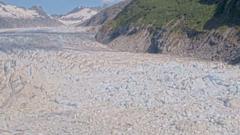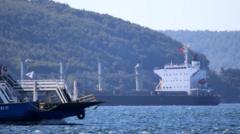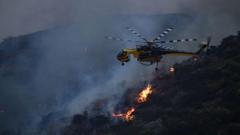**The EU has dispatched aircraft to assist Spain in its battle against devastating wildfires that have led to multiple fatalities and mass evacuations.**
**EU Steps Up Support as Wildfires in Spain Claim Lives**

**EU Steps Up Support as Wildfires in Spain Claim Lives**
**Emergency measures initiated as Spain grapples with lethal wildfires amid soaring temperatures.**
The European Union has mobilized two firefighting aircraft to assist Spain in its fight against widespread wildfires, marking the first invocation of the bloc's disaster assistance protocol by the country. This urgent support comes as the nation mourns the loss of a third individual linked to wildfire-related incidents.
Forecasters predict that heatwave conditions will persist through Monday, with temperatures expected to reach a searing 44 degrees Celsius in some regions. The ongoing wildfires have raised alarms about their potential spread. Since the onset of the crisis, Spain has become the fifth European nation to seek aid in managing such disasters. This follows Greece, where approximately 25,000 acres have succumbed to flames since Tuesday.
In response to the crisis, two Canadair water bombers from France arrived in Galicia on Thursday morning. Government representative Pedro Blanco emphasized that "the fight against fires knows no borders," highlighting the collaborative efforts between nations to tackle the blazes. Interior Minister Fernando Grande-Marlaska noted that, although the planes were not yet needed, their presence was preemptive to prepare for any escalation.
The country has also tragically witnessed the death of a volunteer firefighter in León due to severe burns, marking the second volunteer fatality linked to fires in the area and the third overall. Prime Minister Pedro Sanchez expressed heartfelt condolences and solidarity with the victims' families during these trying times.
Spain’s Civil Guard has reported the arrest of two men suspected of igniting fires in Castille and León, contributing to a total of ten arson arrests since early June. As the summer heat creates favorable conditions for wildfires, Spain is also taking precautions against potential causes such as barbecues and discarded cigarette butts, as starting a wildfire—whether intentional or not—constitutes a crime.
As thousands of residents have been forced to evacuate, 700 individuals in the south-western province of Caceres were ordered to leave their homes on Wednesday. Over in Portugal, more than 1,900 firefighters are currently grappling with four major fires, one of which has ravaged approximately 14,000 hectares since the weekend.
While wildfires are a common occurrence in southern Europe during the summer months, the severity of these incidents has been exacerbated by rising temperatures attributed, in part, to climate change. EU reports indicate that 629,000 hectares of land have burned across the continent this year, with Spain accounting for about a quarter of this total.
Greece is also facing a severe wildfire crisis, with fronts active for three days, particularly on Chios island and in the Achaia region. Emergency services report that 95 individuals, including both firefighters and residents, have sustained injuries due to the flames. A red alert for fire risk has been issued across multiple Greek regions as authorities work tirelessly to manage the crisis. Meanwhile, similar challenges are unfolding in Albania and Turkey, where additional firefighters have sustained injuries in the line of duty.
Forecasters predict that heatwave conditions will persist through Monday, with temperatures expected to reach a searing 44 degrees Celsius in some regions. The ongoing wildfires have raised alarms about their potential spread. Since the onset of the crisis, Spain has become the fifth European nation to seek aid in managing such disasters. This follows Greece, where approximately 25,000 acres have succumbed to flames since Tuesday.
In response to the crisis, two Canadair water bombers from France arrived in Galicia on Thursday morning. Government representative Pedro Blanco emphasized that "the fight against fires knows no borders," highlighting the collaborative efforts between nations to tackle the blazes. Interior Minister Fernando Grande-Marlaska noted that, although the planes were not yet needed, their presence was preemptive to prepare for any escalation.
The country has also tragically witnessed the death of a volunteer firefighter in León due to severe burns, marking the second volunteer fatality linked to fires in the area and the third overall. Prime Minister Pedro Sanchez expressed heartfelt condolences and solidarity with the victims' families during these trying times.
Spain’s Civil Guard has reported the arrest of two men suspected of igniting fires in Castille and León, contributing to a total of ten arson arrests since early June. As the summer heat creates favorable conditions for wildfires, Spain is also taking precautions against potential causes such as barbecues and discarded cigarette butts, as starting a wildfire—whether intentional or not—constitutes a crime.
As thousands of residents have been forced to evacuate, 700 individuals in the south-western province of Caceres were ordered to leave their homes on Wednesday. Over in Portugal, more than 1,900 firefighters are currently grappling with four major fires, one of which has ravaged approximately 14,000 hectares since the weekend.
While wildfires are a common occurrence in southern Europe during the summer months, the severity of these incidents has been exacerbated by rising temperatures attributed, in part, to climate change. EU reports indicate that 629,000 hectares of land have burned across the continent this year, with Spain accounting for about a quarter of this total.
Greece is also facing a severe wildfire crisis, with fronts active for three days, particularly on Chios island and in the Achaia region. Emergency services report that 95 individuals, including both firefighters and residents, have sustained injuries due to the flames. A red alert for fire risk has been issued across multiple Greek regions as authorities work tirelessly to manage the crisis. Meanwhile, similar challenges are unfolding in Albania and Turkey, where additional firefighters have sustained injuries in the line of duty.




















